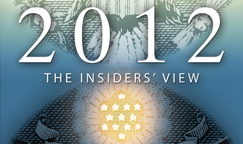Sarah E. Vaala, Ph.D., Martin Fishbein Postdoctoral Fellow at the Annenberg Public Policy Center, and Robert Hornik, Ph.D., Wilbur Schramm Professor of Communication at the Annenberg School for Communication, have published the article “Predicting US Infants’ and Toddlers’ TV/Video Viewing Rates: Mothers’ Cognitions and Structural Life Circumstances” in the Journal of Children and Media. Abstract:

Could Lincoln Be Reelected Today?
Could Lincoln be reelected today? What sort of attack ads might he encounter? What deceptive ads, false claims, and out-of-context quotations might the Illinois Republican face from the likes of Democratic nominee Gen. George B. McClellan and third-party Super PACs? Using a variety of political-campaign techniques, along with parody and humor, FlackCheck.org has reconceived the bruising 1864 campaign in a video timeline.
More gun violence in top PG-13 movies than in biggest R-rated films
The amount of gun violence in the top-grossing PG-13 movies has more than tripled since 1985, and in 2012 it exceeded the gun violence in the biggest R-rated movies, according to researchers at the Annenberg Public Policy Center and the Ohio State University. The overall rate of violence in the biggest box-office movies has more than doubled since 1950, the researchers report in "Gun Violence Trends in Movies," published in Pediatrics.

‘Electing the President 2012’ offers behind-the-scenes look at campaign
“Electing the President 2012,” published by the University of Pennsylvania Press, offers a behind-the-scenes look at campaign strategy and analysis from the insiders who ran the campaigns of President Barack Obama and his Republican challenger, Mitt Romney. The book captures a daylong closed-door campaign debriefing at the Annenberg Public Policy Center on Dec. 6, 2012, a month after the election, with top campaign strategists who spoke freely and questioned each other about their decisions.
How campaign micro-targeting affects fact-checking of political ads
In "Messages, Micro-targeting, and New Media Technologies," published in The Forum in October, Kathleen Hall Jamieson writes that the trend in politics of micro-targeting ads toward individual voters makes it more difficult for reporters and scholars to know "who is saying what to whom, where and with what effect."
APPC Distinguished Fellow Karen Glanz elected to IOM
Annenberg Public Policy Center Distinguished Fellow Karen Glanz has been elected a member of the Institute of Medicine, the health arm of the National Academy of Sciences.
Amy Jordan elected president of the ICA
Amy Jordan, Ph.D., associate director of the Annenberg Public Policy Center, has been elected President Elect-Select of the International Communication Association, the leading international organization devoted to scholarship in the field of communication. Dr. Jordan will assume the presidency of the ICA, which has 4,700 members in 86 countries, in 2015.

Speaker series starts with William Jacoby on ‘Measuring Political Knowledge’
As the first lecturer in APPC's 2013-2014 lunchtime Speaker Series, Michigan State University political science professor William G. Jacoby will talk on Oct. 28 about "Measuring Political Knowledge." He will propose a simple approach to take into account interviewer bias and differences in judgment.
‘Redskins’ question in 2004 Annenberg study cited anew in controversy
A 2004 National Annenberg Election Survey question on whether the name of the Washington Redskins is offensive to Native Americans is in the news amid renewed national debate over whether the pro football team should change its name.
Nursing intervention helps mentally ill people with HIV
Having trained nurses follow up on medication use with mentally ill patients who are HIV positive was effective both at improving the patients’ quality of life and biological markers for the human immunodeficiency virus, according to a new study from researchers at the University of Pennsylvania. The study is thought to be the first to